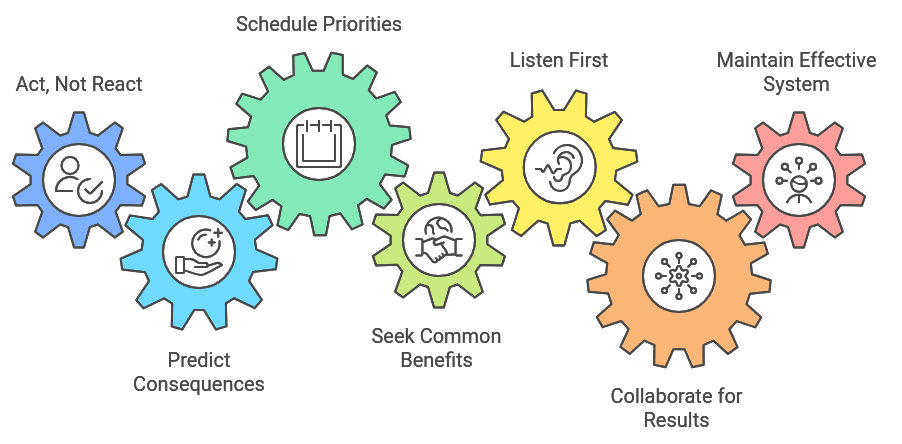“The 7 Habits of Highly Effective People” by Stephen Covey has become one of the most influential guides for personal and professional growth, teaching readers how to develop the habits that lead to long-lasting success and fulfillment. Covey’s insights go beyond surface-level productivity tips, diving deeply into the principles that shape our choices, character, and mindset. In a world where distractions are everywhere, and “busyness” often replaces true productivity, these seven habits provide a roadmap for leading a balanced, purpose-driven life.
This post explores each habit and how applying them can help you make meaningful changes in your life. From prioritizing what truly matters to building positive relationships and taking responsibility for your growth, these habits are designed to empower you from the inside out. Whether you’re looking to improve your personal life, relationships, or career, Covey’s habits offer practical guidance for anyone wanting to move forward with intention. Let’s dive in and see how each habit can bring you closer to being the most effective version of yourself.
Table of Contents
The Right Habits: The Foundation of True Success
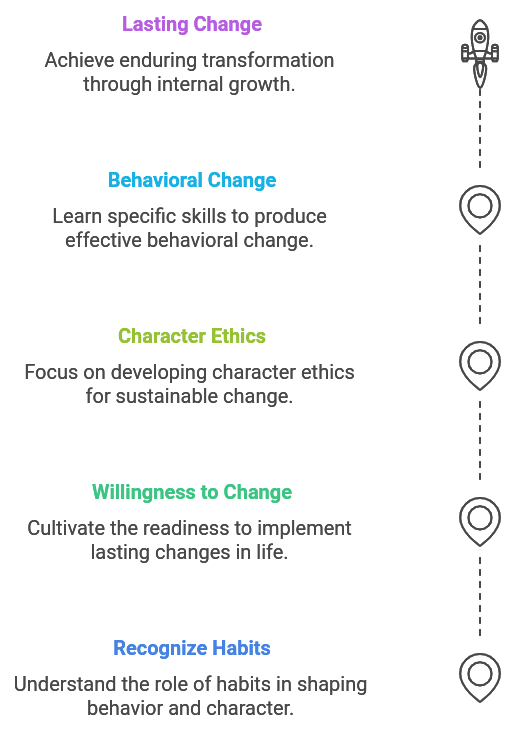
Humans thrive on habits—what we do daily shapes our behavior and ultimately our destiny. Real, lasting success stems from training ourselves to adopt habits that naturally lead us to our goals. While change isn’t easy, it must start from within. Stephen Covey’s principles highlight that true progress comes from character ethics rather than the superficial appeal of personality ethics.
While personality ethics may offer quick fixes, they don’t last. Sustainable change involves shifting our identity, beliefs, and worldview, forming habits that align with values like integrity and honesty. These traits can’t be taught through simple techniques; they grow from genuine internal transformation. The encouraging news? With the right mindset and dedication, anyone can cultivate the habits that lead to becoming highly effective.
Focus on Specific Areas and Shift Your Paradigms for Lasting Change
To become highly effective, it’s crucial to focus on specific life areas:
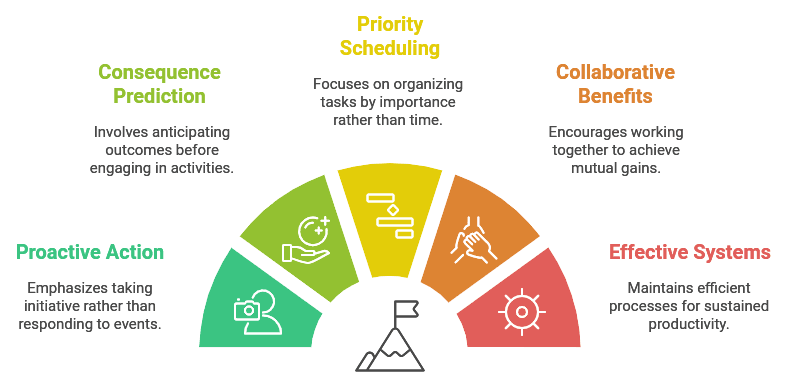
These practices lay the foundation for growth.
Equally important is examining and shifting your paradigms—the lenses through which you view the world. Paradigms shape your reality: a negative mindset sees obstacles, while a positive one finds opportunity even in challenges. True transformation comes when you question your default attitudes and gradually change them.
Stephen Covey’s own paradigm shift came in a subway, when he grew irritated with a noisy child. where he moved from irritation to compassion upon learning that the family was grieving a recent loss. This illustrates the profound power of changing perspectives. Paradigm shifts may not be immediate, but they unlock qualities like empathy and understanding that foster success and better relationships. Embrace this shift to redefine your approach to life.
Exercising Pro-activity Over Reaction
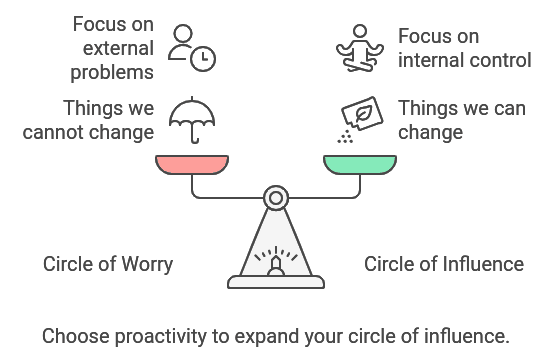
Our ability to be proactive—to choose our responses rather than react impulsively—is a powerful human advantage. While animals respond automatically to external stimuli, humans can pause, assess, and act intentionally. Yet, many of us allow circumstances to dictate our emotions and actions.
Proactive individuals take responsibility for their choices and focus on what they can control, rather than blaming others or external factors. They operate within their circle of influence—areas where they can make a change. In contrast, reactive people dwell in the circle of concern, focusing on things outside their control, which only increases frustration.
Viktor Frankl, a Holocaust survivor, exemplified pro-activity under extreme conditions by choosing his response to suffering. He found freedom by controlling his thoughts. To build pro-activity, challenge yourself daily to take responsibility for your responses, recognizing that your power lies in how you choose to act, not in the circumstances themselves.
Creating Clear Visions and Mission Statements
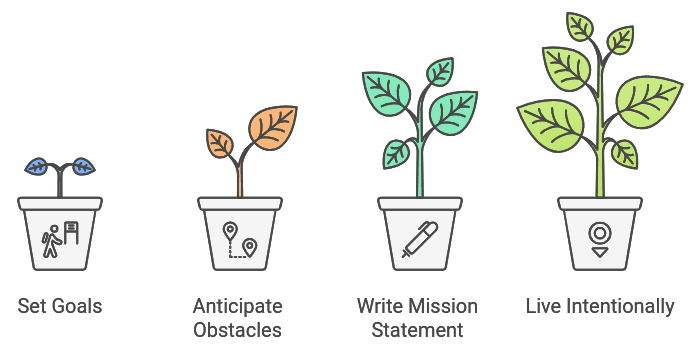
Every accomplishment begins in the mind. We achieve things twice—first by visualizing, then by executing. Just as builders need blueprints, we need mental clarity before taking action. Visualizing your goals with precision makes it easier to bring them to life.
Take time to visualize your goals. Write down what success looks like to you, outline the steps to get there, and anticipate obstacles. This mental practice aligns your actions with your intentions, ensuring you’re not just busy, but effective.
A mission statement is your personal guide—a declaration of your core values and life direction. It defines what truly matters to you, helping to prioritize and eliminate distractions. Write this statement carefully; it’s the foundation of your decisions. With a clear vision and a powerful mission, you’ll steer your life proactively, focusing on goals that genuinely matter and bring lasting fulfillment.
Prioritize What Matters and Aim for Win-Win Outcomes
Life constantly demands our attention, making it easy to focus on what seems urgent rather than what truly matters. Instead of simply filling our schedules, we should prioritize what’s important. This involves identifying tasks that fall into four categories:
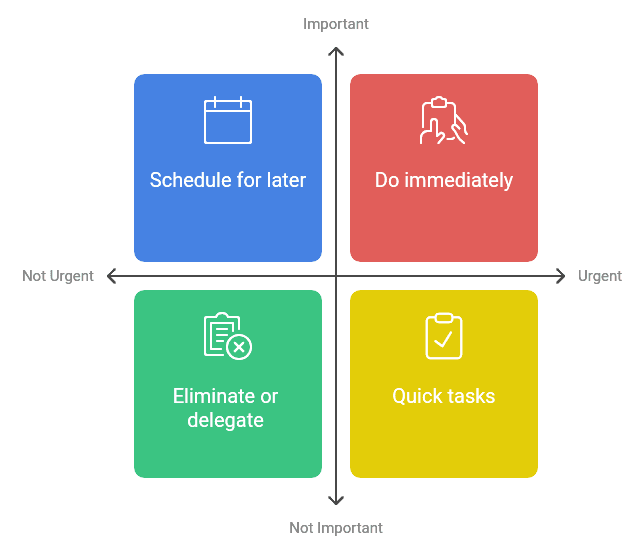
- Urgent and Important: These tasks demand immediate attention and directly impact your life or work. Examples include emergencies, deadlines, or crisis management. They’re essential but should ideally be minimized to reduce stress.
- Important but Not Urgent: This is the most valuable category for long-term success. It includes activities like planning, skill-building, and relationship-building. These tasks don’t demand immediate action but have significant benefits if given consistent attention.
- Urgent but Not Important: These tasks feel pressing but don’t contribute to your goals—like interruptions, minor requests, or trivial tasks. They often drain energy without adding value. Delegate or minimize them when possible.
- Neither Important nor Urgent: This category includes distractions or time-wasters, like excessive social media browsing or unproductive meetings. Limit these activities to focus on what truly matters.
The key lies in focusing on the important but not urgent tasks. These shape our long-term success and help reduce stress over time.
In our interactions, adopting a win-win mindset is equally essential. True success isn’t about overpowering others; it’s about creating solutions that benefit everyone involved. By approaching relationships with sensitivity and patience, we build mutual trust and create rewarding, lasting connections. Apply this mindset not only in work but in all areas of life, including with family, friends, and colleagues, to foster strong, supportive bonds.
Build Strong Relationships Through Deposits in the Emotional Bank Account
Relationships thrive when we invest time, goodwill, and genuine effort—what Stephen Covey calls “deposits in the emotional bank account.” Positive actions, like showing empathy, keeping promises, and listening, increase our balance. Each time we hurt or dismiss others, we make withdrawals. The more positive deposits, the healthier the relationship.
A few key practices can help maintain strong, positive connections:
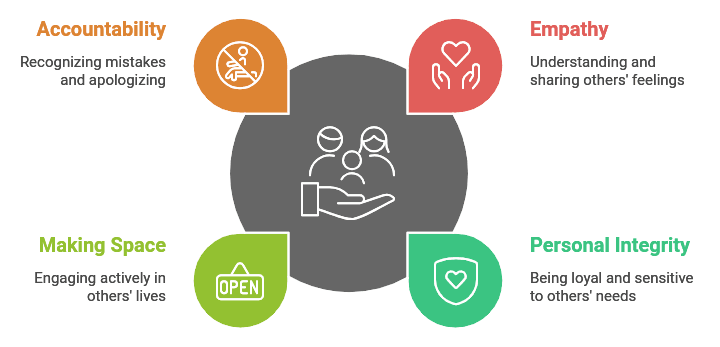
- Empathy and Active Listening: Listen to understand, not just to respond. When we truly immerse ourselves in others’ perspectives, we make people feel valued and understood.
- Integrity and Loyalty: Keeping promises and avoiding gossip shows reliability and respect. Defending others when they’re not present is a strong deposit.
- Accountability: Acknowledging mistakes and apologizing when necessary shows maturity and builds trust.
Empathic listening goes beyond words—body language and tone often reveal more than speech. By focusing on these cues, we foster deeper, trust-based relationships, making others feel seen and heard. These emotional deposits lead to lasting, meaningful connections.
Respect and Openness: The Keys to Achieving Synergy
Synergy happens when collaboration produces results greater than what individuals could achieve alone. To unlock synergy, we need respect and openness. True synergy values different perspectives, recognizing that each person’s unique experiences and skills contribute to a stronger whole.
“Synergy demands that we bring different things to the table, and we should value that.”
Building on respect, empathy, and accountability creates the foundation for synergistic relationships. By listening to understand others’ viewpoints, we open up the possibility of mutual solutions that benefit everyone involved.
A great example is David Lilienthal, who led the Atomic Energy Commission by first fostering trust within his team. He encouraged the team to know each other personally before diving into work. This created an environment of respect and understanding, leading to breakthrough ideas and collaboration.
To achieve synergy, go into interactions with an open mind and a genuine appreciation for others’ strengths. Respectful communication and trust turn differences into opportunities, allowing everyone to work toward shared, impactful goals.
Take Time to Sharpen Your Physical, Spiritual, Mental, and Social Life
We are our greatest asset, and investing in ourselves consistently keeps us effective and resilient. Just like a logger must stop to sharpen their saw, we must take time to “sharpen” ourselves in four essential dimensions: physical, spiritual, mental, and social.
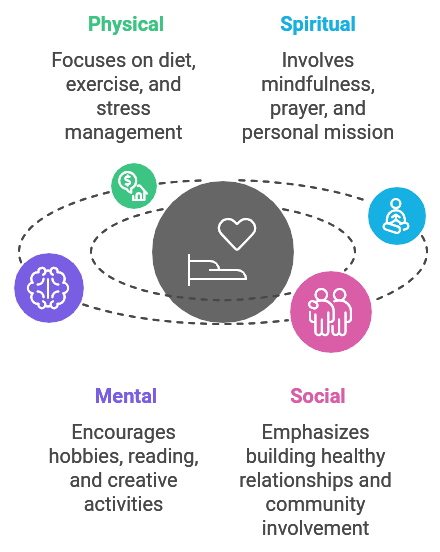
- Physical: Prioritize regular exercise, nutritious food, and stress management. Even 30 minutes a day of physical activity helps keep you energized and resilient.
- Spiritual: Connect with your inner values through mindfulness, meditation, or prayer. This practice grounds you and aligns you with your personal mission, helping you find harmony within.
- Mental: Engage in learning activities—read books, practice creative hobbies, or journal regularly. Reducing passive activities like TV can keep your mind sharp and focused.
- Social: Foster positive relationships. Make time for genuine connections, building trust and understanding with others. We reflect each other’s strengths, and connecting with proactive, like-minded individuals helps us grow.
Taking time for self-renewal not only boosts personal effectiveness but also enhances our capacity to influence and uplift others.

